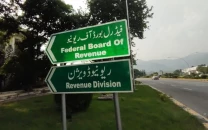Cashless banking surges
Number of transactions via e-banking increased 4.3%, reaching 535 million

In a remarkable shift towards digital ayments, Pakistan is witnessing a rapid transformation in its payment landscape, with millions of people embracing cashless banking channels led by the instant payment system Raast. The growth of online banking has outpaced cash-based transactions, but interestingly, the circulation of physical currency in the system has also spiked. These developments come alongside a significant decline in e-commerce transactions during the reviewed quarter, as highlighted in the State Bank of Pakistan’s (SBP) latest report titled ‘Payment System Review’ for the third quarter of the fiscal year 2023.
According to the SBP report, the number of transactions through e-banking witnessed a 4.3% increase, reaching 535 million in the reviewed quarter, compared to 513 million in the previous quarter. Simultaneously, the value of online transactions grew by a healthy 11% to reach Rs44.29 trillion by the end of March 2023, compared to Rs39.83 trillion previously.
Conversely, paper-based banking transactions experienced a 1.3% decrease in volume, amounting to 94.3 million transactions. However, the value of these transactions saw a 3% improvement, reaching Rs56.76 trillion in the March-end quarter compared to the previous quarter.
In terms of value, cashless banking witnessed an increase of Rs4.46 trillion, surpassing the growth of cash-based transactions, which amounted to Rs1.65 trillion in the reviewed quarter.
This meaningful growth in online retail banking can be attributed to Raast, an instant end-to-end digital payment system facilitating transactions among individuals, businesses, and government entities, said the report. The number of registered Raast users increased significantly by 13% to 29.2 million during the quarter ended March 31, 2023, compared to 25.8 million in the previous quarter.
The SBP reported a 92% increase in transactions processed through Raast, totalling 41.27 million, with the transaction value growing by 56% to Rs903 billion quarter-on-quarter by the end of March 2023. One of the leading reasons for this surge in Raast usage is attributed to its provision of free-of-cost transactions, which distinguishes it from other online banking platforms.
Experts have long emphasised to policymakers and authorities that high transaction fees hinder the growth of online banking in the country. By contrast, e-banking enables the government to document transactions effectively, unlike cash-based transactions, which often lack a reliable record.
However, the significant increase in currency circulation suggests that people may be holding onto cash to pay for goods amid ongoing historical inflation or to prepare for economic and political uncertainties in the country. The circulation of physical currency rose by almost 5%, reaching Rs8.06 trillion in the quarter ended March 31, 2023, compared to Rs7.69 trillion in the previous quarter.
Mobile banking experienced the fastest growth among online banking channels in the country, with transaction volume increasing by 16% to 180 million and transaction value rising by 27% to Rs6.78 trillion quarter-on-quarter in the March-end quarter.
On the other hand, the number of online shopping transactions witnessed a significant decline of 22% to 6.4 million, although the value of these transactions increased by 7% to Rs36.6 billion, according to the central bank’s data.
During the reviewed quarter, the network of point-of-sale (POS) machines expanded by 3%, reaching 112,302 machines by the end of March 2023. The number of internet and mobile phone banking users registered with commercial banks and microfinance banks (MFBs) stood at 9.3 million and 15.3 million, respectively.
The report revealed that banks and MFBs have 6,562 e-commerce merchants registered with them. Additionally, Electronic Money Institutions (EMIs) opened 415,811 new e-wallet accounts, reaching a total of 1.6 million accounts.
The total number of payment cards issued in Pakistan stands at 48.4 million, with 46.0 million issued by banks/MFBs and the remaining 2.4 million issued by EMIs. Among these cards, debit cards dominate, accounting for 76.7% with 37.1 million cards, followed by 9.2 million social welfare cards (19.1%), 1.9 million credit cards (4%), and 0.2% prepaid cards.
Published in The Express Tribune, May 30th, 2023.
Like Business on Facebook, follow @TribuneBiz on Twitter to stay informed and join in the conversation.


















COMMENTS
Comments are moderated and generally will be posted if they are on-topic and not abusive.
For more information, please see our Comments FAQ